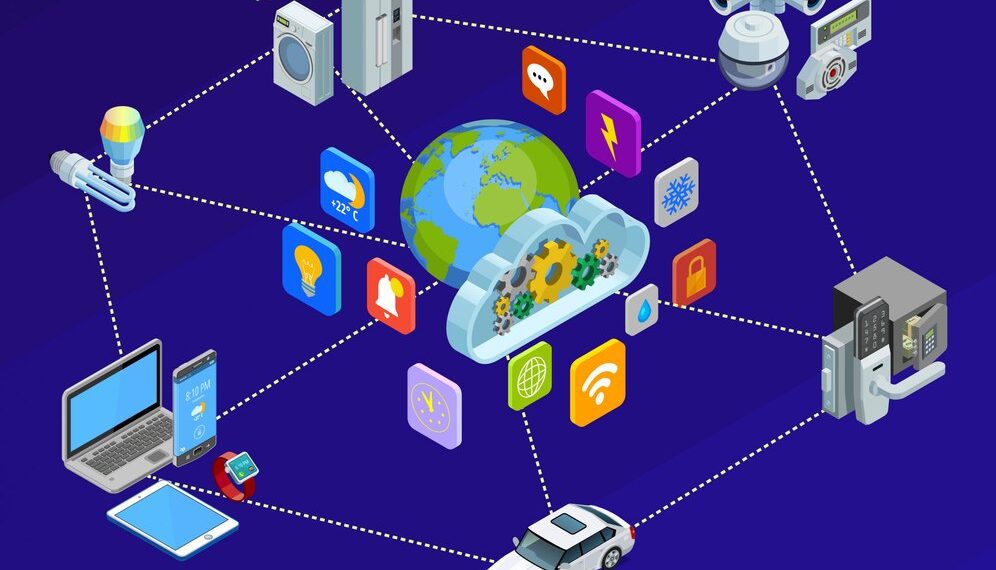In today’s rapidly evolving technological landscape, the Internet of Things (IoT) is revolutionising how businesses operate and interact with their environment. Link up devices and systems to the internet via IoT allows for data analysis and automation of tasks to improve effectiveness, in business functions—from optimizing supply chains to enhancing customer engagement. Despite the advantages offered by technology, there are challenges that must be addressed to fully leverage its capabilities. It is essential, for businesses striving to stay in the market to understand the importance of integrating IoT into their operations. This article explores how companies’ IoT solutions can support business expansion while efficiently addressing any obstacles that may arise.
Understanding the Practical Applications of IoT
IoT integrates physical devices with the internet, enabling them to collect and share data. Its applications are diverse, spanning various industries and domains:
1. Smart Manufacturing
Real-time monitoring, by sensors, allows for the maintenance of equipment to minimize downtime and enhance operational efficiency.
- Example: Predictive maintenance involves utilizing sensor information to detect machinery malfunctions in advance to prevent any interruptions and reduce repair expenses.
- The integration of technology, into robotics systems improves efficiency and accuracy, in manufacturing operations.
2. Supply Chain Optimization
IoT provides real-time tracking of shipments and inventory management, ensuring transparency and efficiency throughout the supply chain.
- Benefits:
- Improved delivery accuracy through GPS-enabled tracking.
- Reduced inventory costs with just-in-time stock management.
- Enhanced decision-making using real-time data analytics.
3. Enhanced Customer Experiences
IoT applications enable businesses to understand customer behavior and preferences, allowing for personalized and dynamic customer interactions.
- Example: Smart home devices that adapt to user preferences provide tailored experiences, building brand loyalty.
- Retailers can analyze foot traffic and optimize store layouts to improve customer satisfaction.
4. Energy Management
IoT solutions optimize energy consumption, leading to significant cost savings and environmental benefits.
- Applications:
- Smart meters monitor and manage energy usage in real-time.
- Automated lighting and HVAC systems adjust based on occupancy and weather conditions.
5. Healthcare Advancements
The use of gadgets transforms the way patients are cared for by allowing monitoring services and enhancing diagnostic procedures while also simplifying healthcare processes.
Example: Wearable health gadgets monitor body signals. Notify both patients and medical professionals about possible health concerns instantly.
The real world uses highlight the game changing possibilities of the Internet of Things, in sectors. Establish it as a key driver of creativity and progress, in technology.
Analyzing the Opportunities and Benefits of IoT
1. Enhanced Efficiency and Productivity
IoT automates routine and repetitive tasks, allowing businesses to focus on strategic objectives. Automation improves process reliability, reduces human errors, and accelerates workflows.
- Example: In manufacturing, IoT-powered automation ensures consistent product quality and faster production cycles.
2. Better Decision-Making with Data
The insights gained through IoT devices enable informed business decisions. Data collected from IoT devices, when integrated with cloud platforms by a cloud consulting company, provides real-time analytics for actionable insights.
- Key Advantages:
- Detecting market trends through consumer behavior analysis.
- Predictive analytics for forecasting demand and supply.
3. Cost Savings
IoT reduces operational expenses by:
- Minimizing resource wastage through precise monitoring.
- Identifying inefficiencies and rectifying them proactively.
- Preventing costly equipment failures with predictive maintenance.
4. Improved Customer Engagement
IoT helps businesses create personalized customer experiences, fostering stronger relationships and brand loyalty.
- Example: Connected devices in retail can recommend products based on past purchases and preferences.
- Smart devices in homes provide seamless integration with other appliances, offering convenience and user satisfaction.
5. New Revenue Streams
IoT opens opportunities for innovative services and products, expanding market reach.
- Businesses can develop subscription-based models for IoT-enabled devices.
- Data collected from IoT devices can be monetized ethically, adhering to privacy regulations.
Considering the Challenges of IoT Implementation
1. Data Security Concerns
With IoT, data flows continuously, increasing vulnerabilities to breaches. Protecting this data requires robust security measures.
- Challenges:
- Cyberattacks targeting IoT devices.
- Risks of unauthorized access and data theft.
- Solutions:
- Implementing encryption and multi-factor authentication.
- Regularly updating firmware and conducting security audits.
2. Integration Issues
Combining IoT with existing systems is complex. Businesses can rely on data integration services to ensure seamless compatibility.
- Common Issues:
- Legacy systems may lack the flexibility to accommodate IoT.
- Inconsistent data formats and protocols.
- Solutions:
- Using middleware platforms for integration.
- Standardizing communication protocols.
3. High Initial Investment
While IoT promises long-term benefits, the initial costs for hardware, software, and training can be significant.
- Businesses must calculate ROI to justify investments.
- Partnering with experienced IoT and cloud consulting companies can reduce upfront costs by providing scalable solutions.
4. Scalability Problems
Not all IoT solutions scale easily. Businesses must plan for growth from the outset.
- Solutions:
- Choosing scalable platforms and modular hardware.
- Ensuring network infrastructure can handle increased data loads.
5. Regulatory and Compliance Issues
IoT solutions must comply with industry standards, which vary by region and sector. Companies must stay informed to avoid penalties.
- Examples of Regulations:
- GDPR for data protection in the EU.
- HIPAA compliance for IoT in healthcare.
- Solution:
- Partnering with legal experts to ensure compliance.
Applying IoT to Your Business
Step 1: Identify Business Goals
Determine what you aim to achieve with IoT, such as reducing costs, improving efficiency, or enhancing customer satisfaction.
Step 2: Choose the Right IoT Company
Partner with a reputable IoT provider to ensure reliable solutions tailored to your needs. They should also collaborate with a cloud consulting company to integrate IoT seamlessly into your infrastructure.
Step 3: Ensure Data Integration
Use data integration services to unify IoT data with other business systems for cohesive operations.
Step 4: Prioritize Security
Adopt robust security measures to protect sensitive data, ensuring customer trust and compliance.
Step 5: Monitor and Optimize
Continuously analyze IoT performance and refine strategies to adapt to evolving needs.
Expanding IoT Applications
1. Smart Cities and Infrastructure
IoT plays a critical role in building smart cities that improve the quality of urban life.
- Key Uses:
- Smart traffic management systems reduce congestion.
- IoT-enabled waste management optimizes garbage collection routes and reduces pollution.
- Real-time monitoring of infrastructure ensures safety and maintenance efficiency.
2. Agriculture and Farming
IoT revolutionizes agriculture through precision farming techniques, ensuring higher yields and resource efficiency.
- Applications:
- Smart irrigation systems use sensors to monitor soil moisture and water crops accordingly.
- IoT-enabled drones survey large farmlands and collect data on crop health.
- Livestock monitoring systems track animal health and location.
3. Retail Innovation
Retailers leverage IoT to create seamless shopping experiences and optimize backend operations.
- Examples:
- IoT-powered smart shelves notify staff when stocks are low.
- Beacon technology provides personalized discounts and promotions to in-store customers.
- Automated checkout systems reduce wait times, enhancing customer satisfaction.
4. Environmental Monitoring
IoT devices monitor air quality, water levels, and other environmental factors, aiding conservation efforts and disaster prevention.
- Use Cases:
Implementing alert systems, for floods. Wildfires not only protects lives but also minimizes the destruction of properties.
Sensors connected to the Internet of Things monitor pollution levels. Provide guidance, for shaping policies aimed at improving the environment.
Emerging Trends in IoT
1. Edge Computing
With the rise of edge computing, IoT devices can process data closer to their source rather than relying solely on centralized cloud systems.
- Advantages:
- Reduced latency in real-time applications like autonomous vehicles.
- Lower data transfer costs and improved security.
2. IoT and Artificial Intelligence (AI)
AI-powered IoT devices enhance decision-making through machine learning and predictive analytics.
- Examples:
- Smart assistants like Alexa and Google Home that learn user preferences.
- AI algorithms in IoT devices that optimize energy usage or production schedules.
3. 5G Connectivity
The rollout of 5G networks significantly enhances IoT performance.
- Benefits:
- Faster data transmission for real-time applications.
- Improved connectivity in dense IoT environments, such as smart cities.
4. Blockchain in IoT
Blockchain technology secures IoT ecosystems by providing transparent and immutable transaction records.
- Use Cases:
- Safeguarding IoT data against tampering.
- Enabling secure and transparent supply chain tracking.
5. Green IoT
IoT solutions are increasingly being designed to minimize their environmental footprint.
- Initiatives:
- Energy-efficient devices that consume less power.
- IoT-driven renewable energy systems like smart solar panels.
Overcoming IoT Adoption Barriers
1. Building IoT Expertise
A lack of in-house expertise often hampers IoT implementation. Businesses can:
- Partner with experienced IoT companies for guidance.
- Invest in training employees to manage IoT ecosystems.
2. Ensuring Interoperability
Many IoT devices use proprietary standards, making integration difficult.
- Solution: Adopt open standards or work with integration experts to ensure compatibility across devices.
3. Addressing Privacy Concerns
Consumers may be wary of IoT devices collecting personal data.
- Actions to Take:
- Implement transparent data usage policies.
- Provide users with control over their data preferences.
4. Preparing for Scalability
IoT projects should be designed to grow with business needs.
- Strategies:
- Choose scalable cloud platforms.
- Opt for modular IoT devices that can be upgraded.
IoT for Future Business Resilience
In a world increasingly defined by digital transformation, IoT equips businesses with tools to adapt and thrive. Its ability to provide real-time insights, automate processes, and predict trends makes it indispensable for navigating uncertain times.
- Post-Pandemic Recovery:
- IoT-enabled supply chains ensure continuity by predicting disruptions.
- Remote monitoring supports distributed workforces.
Conclusion
The Internet of Things (IoTs) plays a role, in revolutionizing and enhancing operations and productivity across businesses.Its numerous applications and advantages present both opportunities and hurdles for companies aiming to maintain an edge, in todays market landscape. Partnering with an IoT company and leveraging cloud consulting and data integration services ensures a smooth and successful implementation. Though challenges exist, they can be mitigated with strategic planning and informed decision-making.
Key Points to Remember
- IoT enhances efficiency, decision-making, and customer engagement.
- Challenges like security and integration require careful planning.
- Collaboration with IoT providers and integration services ensures success.
FAQs
What industries benefit most from IoT?
Industries like manufacturing, healthcare, retail, and logistics see significant gains from IoT implementation.
How does a cloud consulting company enhance IoT capabilities?
By integrating IoT with cloud platforms, they enable real-time data analysis and improved scalability.
Is IoT suitable for small businesses?
Yes, small businesses can use IoT for cost-effective solutions, such as energy management and inventory tracking.
What role do data integration services play in IoT?
They ensure seamless data flow between IoT devices and existing business systems.
How can companies address IoT security concerns?
Implementing encryption, regular updates, and multi-layered security protocols helps protect IoT ecosystems.







